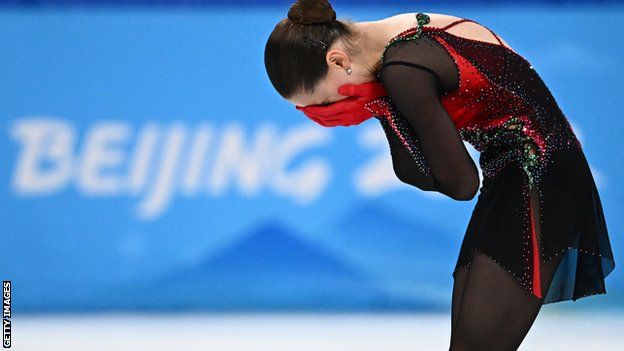Kamila Valieva: Skating minimum age to be raised to 17 following Olympic controversy
- Published

Kamila Valieva, then 15, broke down in tears at the end of her women's free skate routine at the Beijing Olympic Games
The International Skating Union will raise the minimum age for competitors in senior events from 15 to 17 to protect skaters' "physical and mental health, and emotional well-being".
The decision comes after the controversy surrounding Kamila Valieva at the Beijing Olympic Games.
Russian Valieva, then 15, was provisionally banned in Beijing for a failed drugs test.
The minimum age will be 16 for the 2023-24 season and 17 from 2024-25.
ISU president Jan Dijkema called it a "historic decision" after 100 countries backed the change, with 16 opposed.
British Ice Skating was among those backing the change and said it "fully supported" the move.
"The life of an athlete is short and intense, their experience in this short phase sets the platform for the rest of their lives - physically, spiritually emotionally," said Canadian skater and ISU Athletes Commission member Eric Radford.
"While I hear the concerns of certain nations about the immediate difficulty that they might face with this proposal being passed ... is a medal really worth the life of a young athlete?"
What was the Valieva case?
Aged 15 when the Olympics took place in February, Valieva was initially praised after becoming the first woman to land a quadruple jump at a Winter Olympics.
A drugs test failed in December 2021 came to light just before the Russian Olympic Committee was due to be awarded the gold medal for the team event in which Valieva competed.
She had tested positive for banned heart medication trimetazidine but was allowed to compete in the singles event after a court ruling lifted her provisional ban following a series of appeals and re-appeals.
The Court of Arbitration for Sport (Cas) pointed to "exceptional circumstances" regarding her age and the timing of the test result, which came during the Games and nearly six weeks after the sample was taken.
It said it would do Valieva "irreparable harm" if she were not allowed to compete.
But Valieva left the arena in tears after a number of stumbles and falls saw her drop from first place after the short programme to fourth and out of the medals following the free skate.
The teenager's treatment by coaches was also questioned, with International Olympic Committee president Thomas Bach describing the lack of comfort offered after her errors as "chilling".
The doping case is still to be resolved. The Russian anti-doping agency (Rusada) has six months from the date of the notification of Valieva's offence to reach a decision over any sanction which could mean the ruling being delayed until August.
The medals have yet to be awarded for the team event, with USA and Japan finishing second and third, while Canada came fourth.
Recent Games have also seen medals won by Russia's Yulia Lipnitskaya and Alina Zagitova, who both would not have been eligible to compete were the under-17 rule in place at the time.
Lipnitskaya and Zagitova were 15-year-olds when they won won gold at Sochi 2014 and Pyeongchang 2018 respectively.
Brand-new Top Gear: The boys are back and Florida awaits...
How did the 'Wagatha Christie' trial unfold?: Here's Ros Atkins' quick summary of the libel case